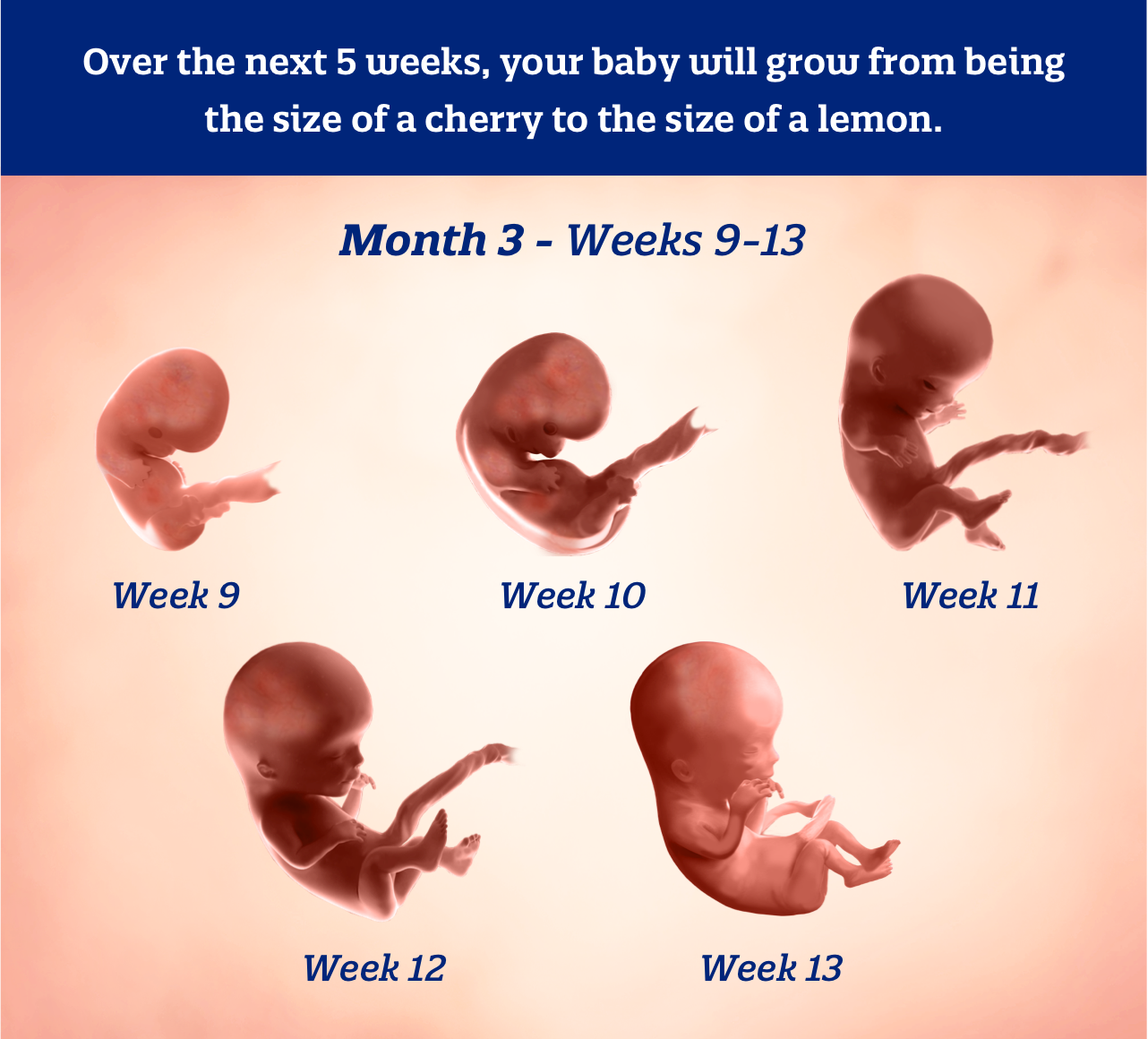Due to maintenance, rewards points for receipt uploads will be delayed. Thank you for your patience!

Discover the exciting ways your body and baby are developing during your third month of pregnancy.
Congratulations! You’re 3 months pregnant and in the last weeks of your first trimester. You may still be experiencing some morning sickness, as well as a few new issues like constipation and vaginal discharge. Your breasts may be growing and your baby’s internal systems are developing. Let’s dive and explore what’s going on with you and your little one.
Constipation, characterized by hard, infrequent, or difficult-to-pass stools, may be an issue as hormones and the iron in your prenatal vitamin may contribute to a digestive system slowdown. To help manage constipation, try drinking lots of water, upping your fiber intake, and fitting in some regular exercise. Contact your healthcare provider right away if the constipation is accompanied by abdominal pain or blood or mucus in the stool.
At 3 months pregnant, you may notice an increase in a mild-smelling vaginal discharge. This white, milky, and thin discharge typically starts in early pregnancy and can last throughout the nine months.
If you find the discharge irritating and uncomfortable, use a panty liner to help absorb moisture. To help support the balance of good bacteria that may help avoid infections, keep the area dry by wearing breathable cotton underwear. Avoid douching or wearing a tampon. Tell your doctor if you have indications of a vaginal infection, such as discharge that smells foul and is green or yellow, or if you’re experiencing itching and redness.
Find yourself having to pee a lot more? Frequent urination is a common early pregnancy experience due to hormonal changes and increased water consumption to help deal with constipation. Urinary frequency will also increase in later months as your baby grows and puts pressure on the bladder.
Since it’s so important to keep hydrated, cutting back on fluids is not recommended. If the need to urinate is waking you up at night, try to increase your fluid intake in the morning and afternoon and cut back in the evening. If you’re feverish and experiencing pain or a burning sensation when peeing, see your doctor, as these could indicate a urinary tract infection.
Your breasts will continue to change throughout your pregnancy. By your third month, your breasts will most likely be larger and more sensitive as your body prepares for lactation. You may also notice darkened and enlarged areolas and nipples.
Around this time, your breasts may begin leaking colostrum, a thick, sticky yellow, clear, or white fluid known as the “first milk.” It may leak throughout your pregnancy and will also be produced the first few days after giving birth. Colostrum is filled with proteins and antibodies that can benefit your baby; it will make up your little one’s first meals before the mature breast milk supply comes in.
For extra support and comfort, consider wearing a full-coverage bra during the day and a sleep bra at night—you may have to go up a size or two. Taking a warm shower, using a cold compress, and opting for looser tops may also provide some relief.
You may still be dealing with morning sickness during your third month of pregnancy. Hang in there; for many women, that notorious nausea and vomiting often improves significantly after the third month. Fatigue, mood swings, food cravings, and food aversions may also continue to be issues. Contact your doctor with any questions or concerns about anything you’re experiencing.
And good news! At 3 months pregnant, you’re finishing up your first trimester. At the end of the month, you’ll have just 27 weeks to go until you meet your little one!
Every mama is different and some women start showing at 3 months pregnant, while others may take a little longer to sport a bump, especially if it’s a first pregnancy. And while you may not need maternity clothes quite yet, things are expanding internally—your pre-pregnancy orange-sized uterus has grown to the size of a grapefruit.

At 3 months pregnant, the fetus has just about all their internal systems formed, including the circulatory and urinary systems, heart, and liver. Those cute fingers that will be wrapped around yours soon enough are also formed, and tiny vocal cords that will let out those adorable giggles and gurgles are developing. Your little love is approximately the size of a lime.
You’re 3 months pregnant, and so much is happening to you and your baby as you wind down your first trimester. Enfamil Family Beginnings can help you get ready for the amazing changes pregnancy and parenthood will bring. It’s the perfect resource for new and expecting moms. Save on Enfamil products, track your bump and baby’s growth, and get helpful articles each week relevant to your journey. Join now.
Toda la información de Enfamil, incluyendo, pero no limitada a la información sobre la salud, condiciones médicas y nutrición, está destinada a tu conocimiento en general y no substituye la identificación del cuidado médico de un profesional de la salud, consejos o el manejo para condiciones médicas específicas. Debes buscar atención médica y consultar a tu médico o pediatra por cualquier problema específico de salud o nutrición. Nunca ignores el consejo médico profesional ni retrases la búsqueda de tratamiento, atención o ayuda médica debido a la información que hayas leído en Enfamil